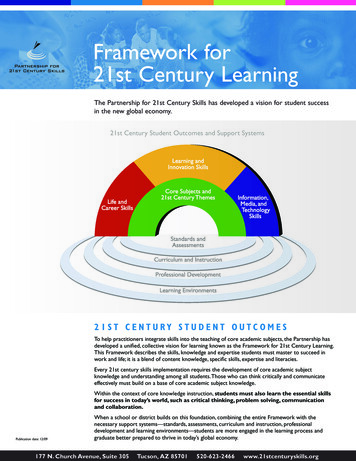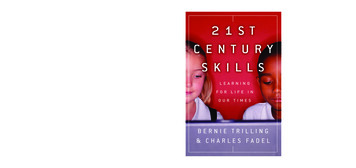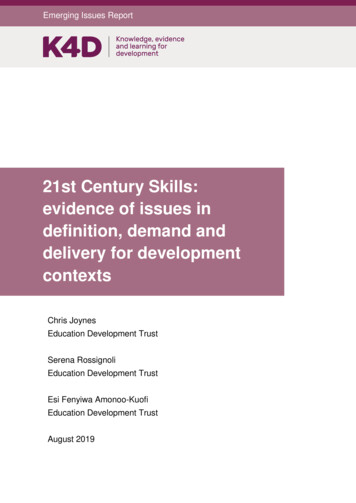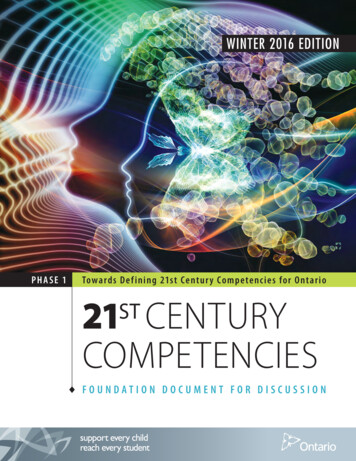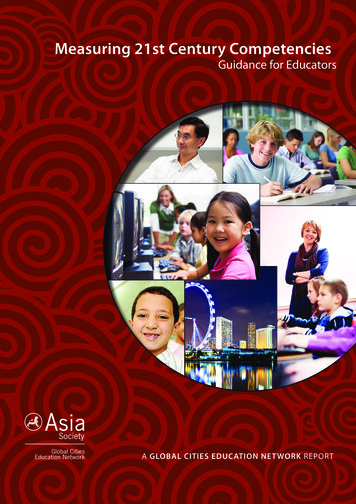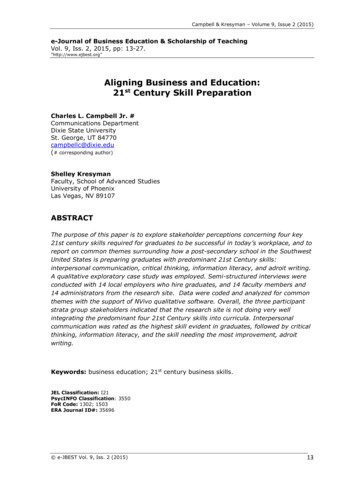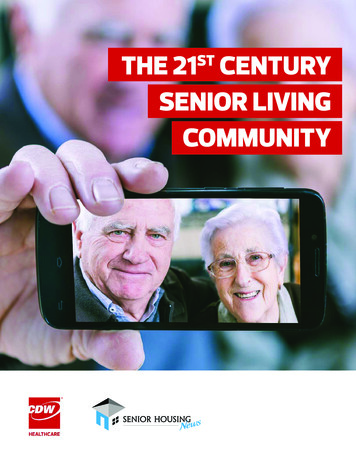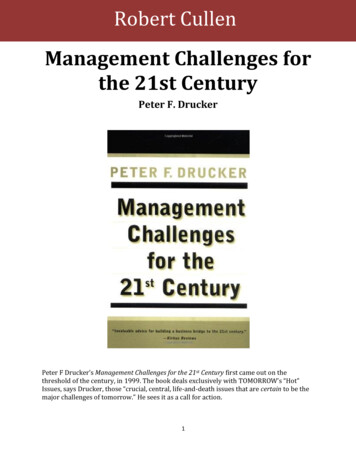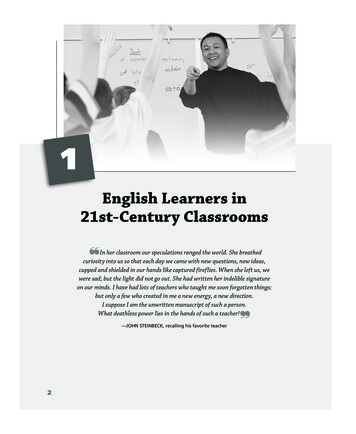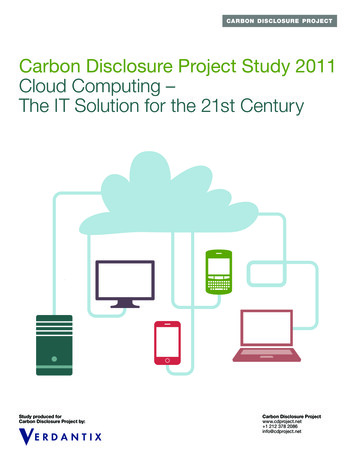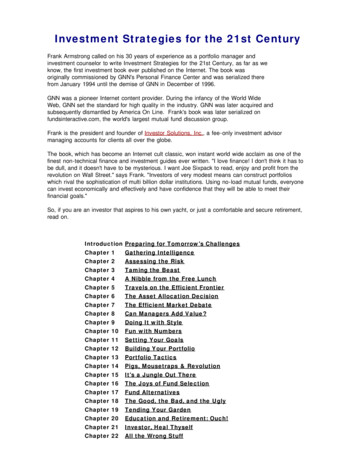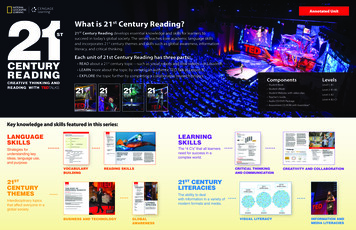
Transcription
& POSTGRADUATE BROCHUREMASTER OF BUSINESSADMINISTRATION“You cannot teach21st Century skillsin a 19th Centurylearning environment.”- Prof. Ahmed Shaikh.Managing Director,REGENT BUSINESS SCHOOL2022
CONTENTS02MESSAGE FROMTHE DEAN12HIGHLY QUALIFIED ANDCOMMITTED FACULTY04THE RBSPHILOSOPHY14MBADEGREES06iLeadLAB @regentCREATING AGILE LEADERS36POSTGRADUATEQUALIFICATIONS08INTRODUCING REGENTBUSINESS SCHOOL58REGISTERING FORTHE PROGRAMME10GLOBAL NETWORKOF STUDENTS01
MESSAGE FROMTHE DEAN02On behalf of REGENT BUSINESSSCHOOL, I am honoured and greatlyprivileged to extend a warm welcome toyou. As a postgraduate student, you have taken thedecision to become a scholar in your chosen discipline.As such, as a holder of a post-graduate qualification,you have joined the ranks of the academic elite.REGENT acknowledges that you, as a postgraduatestudent, are already familiar with the demands ofhigher education. For that reason, the institution seeksto provide education that is aimed at bringing outthe best in you and to support you to start making acontribution to the body of knowledge in the field ofbusiness and management.
While the programmes in this brochuremeet the requirements for accreditationby the regulatory authorities in SouthAfrica, REGENT has gone beyond merecompliance and responded directly to theopportunities presented by the FourthIndustrial Revolution. The institution hasdeveloped unique pedagogical spaceswhere you will be encouraged to refineyour design thinking, problem-solvingand collaborative learning skills. We arelooking forward to welcoming you to theiLeadLAB at various learning supportcentres throughout the country.Other initiatives that will benefit youinclude participating in the discussions andactivities at the redHUB. The redHUB isthe REGENT Enterprise DevelopmentHub, where you will be exposed to the insand outs of enterprise development.Come and enjoy the REGENT blendedmode of delivery that leverage theavailable technology to offer tech-rich,future-focused learning.For those who will be pursuing theMBA, the good news is that REGENTBUSINESS SCHOOL has achievedaccreditation for the Doctor of BusinessAdministration (DBA). In 2021 twocohorts of DBA candidates wereregistered to pursue the Doctoral degree.In this way, the institution offers you anarticulation route into the pinnacle of anyscholar’s career – the Doctoral degree.Come and enjoy theREGENT blendedmode of delivery thatleverage the availabletechnology to offertech-rich, futurefocused learning.This brochure will provide you with all theinformation you require to make your finaldecision regarding which programme tochoose and study.I look forward to welcoming you at REGENTBUSINESS SCHOOL.- Dr Ronel Blom(Academic Dean)REGENT BUSINESS SCHOOL03
THE RBSPHILOSOPHY04VISIONTo be a leading provider of entrepreneurial, business andmanagement education and to develop business leaders throughresearch and innovation.MISSIONTo provide accessible, affordable, and quality entrepreneurial,business and management education, responsive to the criticalneeds of South Africa and the African continent within thecontext of a dynamic global environment.
OUR VALUESThe core values that underpin the vision and mission of REGENT BUSINESS SCHOOL are: Knowledge: The creation and dissemination of knowledge through teaching and learning,research and innovation, and critical engagement with all stakeholders. Social Responsibility: Serving and engaging for the overall betterment of society. Sustainability: Integrating social, environmental, economic and technologicalconsiderations into teaching, learning and research strategies. Ethical Behaviour: Practising ethical leadership based on the principles of governanceefficacy and efficiency. Diversity: Applying the principles of social justice in dealing with the critical issues ofdiversity, race, access to education, gender, equity and disability. African continent withinthe context of a dynamic global environment.EMPLOYABILITY UNITREGENT BUSINESS SCHOOL’s iLeadLAB, the Innovation andEmployability unit of the institution, aimed at empowering it’sstudents with core skills and competencies to creatively bridgethe gap between education and the demands of the 21st centuryworkplace, is a direct response to the accelerated pace of globaltechnological transformation. Digital advancements, breakthroughsand pioneering developments are occurring at warp speed, plungingthe global workplace into a space where it’s no longer enoughto effectively play by the rules. Instead, graduates must boldlyinnovate and step-change to remain relevant in dynamic, digitallydriven environments. REGENT’s new iLeadLAB is a direct responseto these changing employment requirements of the 21st Century.Today, employers are looking for Leaders, Managers,Entrepreneurs and high-performance individuals- youth andmid-career employees - who are in sync with the demands of arapidly-changing digital workforce. The iLeadLAB has a rangeof programmes that offer hands-on development in CriticalThinking and Problem Solving, Digital Literacy, and Creativityand Imagination. Students are taught effective communication,information literacy, civic responsibility, job search skills, time andconflict management, exposure to 2D and 3D printing and a rangeof technologies relevant to industry 4.0. It is revolutionary supportfor career-minded individuals who recognise that multi-skilling andrelevant-skilling will give them the edge in a world where the onlyconstant is digital change.05
INTRODUCING REGENTBUSINESS SCHOOL06At the core of its institutional philosophy,REGENT BUSINESS SCHOOL (RBS) is about innovation andentrepreneurship. It is about nurturing and shaping leadersand entrepreneurs to have an impact in their context. At RBSunderstanding today’s important challenges that confrontbusiness and society, and discovering tomorrow’s interestingopportunities, are at the heart of our teaching and learningstrategy, research and community engagement. RBS is aniche Business School with a community of passionateand dedicated individuals who understand and appreciatethat higher education is now the centre of gravity of thedevelopment debate, and rightly so. More than 50 percent ofthe population of sub Saharan Africa is younger than 25 yearsof age, and every year for the next decade, 11 million youth areexpected to enter the job market. This so-called demographicdividend offers tremendous opportunities for Africa to build aformidable base of human capital that will serve as the key driverfor the economic transformation of this continent.
It is in this context that RBS has grounded itsmission and purpose to: Widen access to higher education for youngminds, leaders and entrepreneurs Expand the knowledge base and skills setsof its students in order for Africa to be morecompetitive Enable the expansion of trade and the removeof barriers of entry into new markets for Africanbusinesses. Student surveys indicate that RBSalumni hold executive and leading positionsacross Africa, the Middle East, WesternEurope and Asia. Further, the current studentpopulation of RBS is very representative of thedemographic make-up of communities in SouthAfrica and countries in the SADC region.The supported distance learning mode of delivery,carefully designed curricula as well as affordablefee structures make RBS programmes a preferredchoice for persons in full-time employment inparticular. RBS has established academic andresearch linkages with partner universities andresearch institutions in Africa, the United Kingdom,Russia, China and India.This ensures that RBS staff, students and alumni arecontinually exposed to international best practicesand expertise from academic, professional, private,public and civil society sectors from a range ofcountries across the globe. This active researchfocus linked with the wealth of intellectual capital,a pool of qualified and experienced faculty andspecialised experience in delivering distancelearning programmes over the past two decades, hasallowed RBS to design and deliver effective highereducation programmes for students both in thepublic and private sectors.INTERNATIONAL RECOGNITIONINTERNATIONAL PARTNERSHIPSMember Institution ofHONORIS United UniversitiesRBS has held the prestigious ‘Two Palme’ award by the Eduniversal InternationalScientific committee since 2008. This award acknowledges the quality of RBSprogrammes as well as the international influence in their delivery. As part ofit’s ongoing efforts to strengthen its African roots, RBS participates in theAssociation of African Business Schools (AABS) and is an active member of theSouth African Business Schools Association (SABSA).Almaty Academy of Economicsand Statistics (Kazakhstan)HONORIS Educational Network(Mauritius)Namibia Chamber of CommerceGitam University (India)Shanghai University of InternationalBusiness and Economics (SUIBE)(China)Quality confirmed by AccreditationREGENT BUSINESS SCHOOL is registered as a private highereducation institution with the South African Department of Higher Educationand Training (DHET) (Registration certificate number: 2000/HE07/012).REGENT BUSINESS SCHOOL Programmes are:1. Accredited by the Council on Higher Education (CHE).2. Registered on the National Qualifications Framework (NQF) by the SouthAfrican Qualifications Authority (SAQA).3. Registered with the Department of Higher Education and Training (DHET).4. Recognised by the Nambian Qualifications Authority (NQA).5. Recognised by the Mauritian Tertiary Education Commission (MTEC).RBS is also a pipeline member of the Association of African Business Schools(AABS).07
CREATING AGILE LEADERS WITHCOLLABORATIVE MINDSETS FORTHE 21ST CENTURY WORKPLACE08
Our new iLeadLAB is a direct response to these changing employment requirements of the 21st sCriticalThinkingStress & ConflictManagementCreativity &Design Thinking09
GLOBAL NETWORKOF STUDENTS10When you enrol for the MBA programme, you join anetwork of like-minded students and graduates spanningthe world. RBS is a place where students find friendship,build their social and resource networks, learn and developto be world-class leaders. The Alumni Association of RBSexists to promote and facilitate links between REGENTBUSINESS SCHOOL and its alumni community andto foster a life-long commitment. RBS delivers its MBAprogramme in various international locations throughexperienced faculty members. This offers opportunitiesfor rich academic and cultural exchange, enabling abetter understanding of international practice and waysof conducting business.
Our graduates are competent and comfortablein national and international businessenvironments. Evidence of this comes throughthe annual RBS survey of alumni, tracking theprogress and achievements of RBS graduates.RBS alumni population has shaped thecommunity with their distinct characteristics;highly professional and talented, energetic,supportive, empathetic and innovative. Ourgraduates continue to hold executive positionsin countries as widely dispersed as Hong Kong,Pakistan, UK, Saudi Arabia, Oman, Australia,Kenya, Namibia, Botswana and many otherAfrican countries.It’s quite intimidating when you haven’tstudied for a long time, but I must saythat at REGENT BUSINESS SCHOOLthey made me feel at home, they mademe feel comfortable with everything,they were on-hand to be able to helpme, I enjoyed the lessons that were onweekends because I did this while I wasworking.- Margaret HirschCOO - Hirsch’s11
HIGHLY QUALIFIED ANDCOMMITTED FACULTY12It has to be fully appreciated that the faculty atREGENT BUSINESS SCHOOL are individuals that holdthe highest academic qualifications ranging from MastersDegrees in Business Studies and the Social Sciences,including Doctoral Degrees in Public Management,Philosophy and other fields of engagement within academia.These faculty members derive from diverse academicbackgrounds and, have served at other universities bothlocally and internationally and, some of them have beentried and tested technocrats and policy makers withinthe public service of the Republic of South Africa. Thisdiverse academic and public sector experiences hold themin good stead, in respect of the aim and philosophy of theREGENT BUSINESS SCHOOL’s flagship programme,the Master’s Degree in Business Administration (MBA).The wide experience of these academics is in congruencewith the institutional vision, mission and core values, whichvery seriously addresses the transformation agenda ofSouth Africa and Africa as a whole.REGENT BUSINESS SCHOOL togetherwith its highly qualified and committedfaculty adds further importance to thetransformative business and managementeducational needs of higher education, withinthe context of global emerging markets.In addressing these fundamental and core issues theSchool is able to provide a global view of the imperativesof the intricate nuances that permeate political economydebates, the importance of entrepreneurship in the contestof Africa as a whole, and sees to it that, management andleadership perspectives are enhanced within its teachingand learning programmes. The faculty with its diverseand wide experiences are more than actively involved inresearch and play a pivotal role in all aspects of curriculumdevelopment and, in so doing understand the facets ofglobalisation which bears direct relevance to the teachingprogramme.
Dr Ronel BlomPhDProf Osman SeedatMBADr Shahiem PatelPhDNadeem CassimReading for PhDPranisha SalikramBCom Acc HonsDr Sayed RehmanPhDSuveera SinghReading for PhDShaheen KhanMBAOlivier NiyitegekaDCom13
14MBADEGREES
15
CHOOSING THE RBSMBA DEGREEThe philosophy of the MBA programme atREGENT BUSINESS SCHOOL is in congruencewith the institutional vision, mission and core values,adding further significance to the transformativebusiness and management educational needs of globalemerging economies. Furthermore, it provides a globalview of entrepreneurship, management and leadershipperspectives, while embracing the relevance of regionaland local context. In essence, while RBS continues withits quest to make business and management educationaffordable and accessible, the primary aim of the MBAprogramme is to shape and nurture socially responsibleentrepreneurs, public and private sector managers andleaders for the renaissance of emerging economies. Itis quite obvious that many of the emerging economiesof the world are experiencing a renaissance. However,entrepreneurship, management and leadership skillsdevelopment have been seriously lagging. Equally,issues of corruption, ethics, social responsibility andenvironmental sustainability have left an indelible markon the fabric of these economies.An MBA forUnconventional ThinkingA Challenging Curriculum That ritical DecisionMakingCompetenciesCulminating eInfluentialChangeInitiation
17
REGENT BUSINESSSCHOOL’S MBA18Develops and Prepares anEntrepreneurial SpiritThe word entrepreneur originates from the French word,entrependre, which means ‘to undertake’. In a businesscontext, an entrepreneur is one who organises, managesand assumes the risks of a business enterprise.The MBAat REGENT BUSINESS SCHOOL encapsulates thefollowing salient aspects of preparing and developing anentrepreneurial spirit:PioneeringchangeContributingto valuecreationInnovativeapproaches tobusinessMitigatingrisk
More importantly, the MBA will allow you to find your niche within the private or publicsector. This will enable: The creation of opportunities to be involved in the development of policy imperatives The analysis of economic variables An understanding of the nuances of culture that influence economic and politicalissues Insights into the global political economy.Peter Drucker said: “The entrepreneur always searches for change, responds to it, andexploits it as an opportunity.”The REGENT BUSINESS SCHOOL MBA will prepare you to put Drucker’s views intopractice. In other words it will prepare you to understand that an entrepreneur who cantake an idea and transform the concept into reality can bring to market a viable productor service that people want or need.The MBAProgramme StructureSAQA ID: 97437 / NQF LEVEL 9The REGENT BUSINESS SCHOOL MBA consists of twelve coursework modules(eleven core modules and an elective module) and a dissertation component.The duration of the programme is 20 months.The programme structure is outlined as follows:YEAR12DURATIONMODULESSemester 1(6 months) Strategic and Change Management Accounting and Finance Leadership and Human Capital Development Governance and SustainabilitySemester 2(6 months) Managerial Economics Strategic Marketing Information and Knowledge Management Operations and Supply Chain Management Global Political EconomyTrimester 1(4 months) Entrepreneurship Research and Statistical Methods ElectiveTrimester 2(4 months) Dissertation19
THE MBAJOURNEY20
21
DELIVERING THEMBA PROGRAMME22The MBA programme is primarily offered through the distance modeof delivery. This includes a flexible blend of workshops and lectures,syndicated learning and independent study as well as ongoingacademic support and mentoring by academic staff. The programmedelivery is sensitive to the diverse needs of students especially thosewho continue to work full-time while studying.1. Face to face interactionFace to face contact is provided at a range of venues, dependenton student numbers. These contact sessions are conducted overweekends to accomodate working professionals.2. RBS Orientation sessionAll students will join us either online or physically for a RBSorientation, which will involve lectures, case studies, group work,examination practice, networking and social events along withstudy skills sessions.
3. Study materials and workbooksAt registration, each student receives a comprehensive study pack containing study materials for eachof their registered modules, a detailed academic calendar and other relevant details of the academicprogramme, either included or shared via the Learner Management System (LMS). You will also havescheduled activities throughout each module.4. Module co-ordinatorModule tutors will provide support for students. They will facilitate live sessions, moderate onlinediscussions, make sure students are up to date with subject-relevant topical information, and generallyoversee their development of study skills. Tutors will also be available telephonically and by email.5. Student SupportRBS has a dedicated student support division which provides a range of services supporting the holisticdevelopment of the student and is augmented by available academic support. Provision is made for a widerange of support services, teaching resources and learning resources that promote students’ academicskill and success at all levels of study. Additional support ranging from managing the challenges ofdistance studies, to professional individual and group counselling services are made available to students.THE MBA SUPPORTED DISTANCE PROGRAMMEThe MBA degree is offered through a delivery format referred to atRBS as the ‘Supported Distance’ MBA. This format is geared towardsstudents who prefer increased contact through their studies. MBAstudents on the ‘Supported Distance’ format participating in sessions,undertake case study analysis, business simulations and group work.Advantages of the ‘Supported Distance’ programmeAttending lectures together with the same group of students offers: A network of colleagues with lasting business and social contacts Dedicated study time and interaction with experienced academics Increase in one on one tuition time Engagement in debate surrounding topical issuesExamination venuesExaminations are written in a number of venues across South Africa aswell as in Namibia and Eswatini.23
THE MBACURRICULUMIntroductionWithin the context of the REGENT BUSINESS SCHOOL (RBS) MBAPhilosophy, the RBS MBA curriculum aims at developing a student’s intellectualability, executive personality and managerial skills through an appropriate blendingof business and multi-disciplinary education. The MBA curriculum providesstudents with a comprehensive management education of globally recognisedbest practices with flexibility of their adaptation to indigenous entrepreneurialand societal context. The curriculum of the programme ascends from generalmanagement education to specialisation in diverse business fields. Generalmanagement skills like oral and written communication, decision-making,leadership, and teamwork developed among the students at the initial level of theprogramme will provide them with a solid foundation for more advanced studiesat the elective level during subsequent stages. Core modules taught integrateinformation and theories from various disciplines, including communication,economics, accounting, quantitative methods, marketing, finance, organisationalstructure and strategic management. The RBS MBA prepares students to thinkcritically about business issues in order to enable them to develop strategiclevel understanding and demonstrate comprehension of complex theoreticalconstructs in the major business disciplines.Strategic and Change ManagementIn today’s volatile environment, with the accelerated rate of change,organisations that successfully manage strategic initiatives save more moneyand are poised to gain an advantage over their competitors. Today, there ismuch talk about change management because organisations live in a muchmore dynamic environment than in the past. The purpose of this module is toenable students to make a strategic diagnosis based upon the analysis of thecompetitive environment and the identification of the strategic capability oftheir organisation in a context of a dynamic environment.Managerial EconomicsManagerial economics applies economic theory and methods to businessand administrative decision making. Managerial economics prescribesrules for improving managerial decisions. Managerial economics also helpsmanagers recognise how economic forces affect organisations and describesthe economic consequences of managerial behaviour. It links traditionaleconomics with the decision sciences to develop vital tools for managerialdecision making. Managerial economics is concerned with the business firmand the economic problems that business management need to solve. It isthe integration of economic theory and business practice for the purpose offacilitating decision-making and forward planning by management.24
Strategic MarketingEvery organisation needs to have clear marketingobjectives, and the major route to achieving organisationalgoals will depend on strategy. It is important, therefore,to be clear about the difference between strategyand tactics. The purpose of this module is to create anunderstanding of how marketing management createsvalue in an organisation by examining the core principlesof the marketing concept and amplifying the elements ofa marketing strategy.Global Political EconomyIt is generally accepted that the world has experiencedmultifaceted and revolutionary change over the last fourdecades or so. A shift is taking place from the traditional,largely bipolar, to a multipolar, world order. The notionof political economy underlines the fact that politicsand economics are closely linked in all countries. Thechallenges and complexities facing organisations cannotbe separated from broader international developments.Organisations operate in a global world where economiesand societies are intertwined. Within the context ofglobal competition and trade, countries are tied via theirbusiness economic structures. The module defines thestudy of international political economy, summarisesmajor analytical frameworks in the field, and identifiescurrent debates.Governance and SustainabilityGovernance failures both locally and internationallyhave filled the media and have negatively impacted onconfidence in the free market system. The sheer size andcomplexity of business makes it difficult to understandall the potential problems which lie in wait for apparentlysuccessful organisations. Globalisation and the pervasiveuse of technology add further complications. It is alsoacknowledged that human activity has an influence on theenvironment and eco-systems in general. Sustainability isthe need to allow the natural world to refresh itself whileproviding sufficient resource for human life. The primarypurpose of this module is therefore to outline the needfor governance measures in the private and public sectorsand to enable students to reflect on values and levels ofintegrity.25
Leadership and Human Capital DevelopmentIn this competitive global economy, managers mustcontinuously seek ways of improving human capabilities andthe performance of organisations in order to compete, surviveand thrive. In addition, one of the main differences betweensuccess and failure in any organisation is how its leadershipoptimises the use of its human capital resources to takeadvantage of strategic opportunities. This module details thetask and scope of human resources management in the contextof a legislative framework and a dynamic organisational micro,and macro environment.Operations and Supply Chain ManagementOperations and Supply Chain Management is concerned withthe management of resources and activities that produceand deliver goods and services to customers. Efficient andeffective value chain activities and operations provide anorganisation with major competitive advantages since theability to respond to customer and market requirementsquickly, at a low cost, and with high quality, is vital to attainingprofitability and growth through increased market share. Ascompetition becomes fiercer in an increasingly open and globalmarketplace, a company’s survival and growth becomes greatlycontingent on its ability to run its operations efficiently and to26exploit its resources productively. Thus this module focuses onthe concepts, issues, and techniques for efficient and effectivevalue chain activities and operations.Accounting and FinanceThe purpose of this module is to enable the student to makestrategic financial decisions as part of the financial managementprocess which is critical to the success of any organisation. Thismodule will also enable the student to develop practical skillsapplicable to interpreting financial statements, budgeting,cash-flow analysis, analysing organisational costs and makingshort-term and long-term investment decisions. The study ofthis module will also enable students to recognise the varioussources of finance, evaluate the various costing systems anddesign techniques for the effective management of workingcapital.Information and Knowledge ManagementEarly ideas of information and knowledge application havechanged into looking at awareness application showingpeoples’ availability and activities. All enterprises, whether inthe private or public sector, need excellent information andknowledge strategies to succeed. The combined knowledge ofthe employees is in many cases considered to be the main asset
of an organisation. The information that the knowledge is based upon can, to some extent, bestored and made available for everybody within the organisation. The purpose of this module is toreview the value of information as a resource to the value chain of an organisation and examinethe management of information and the information technology function in an organisation. Thismodule also equips students with knowledge, skills and approaches to information and knowledgemanagement in organisations.EntrepreneurshipThis module aims to equip the student with knowledge about the critical roles of innovativeentrepreneurship and business management in the creation of employment and development of acountry’s economy. After the completion of this module, the student will have gained knowledgeabout the role of integrating business management concepts in a technical and innovative settingto meet today’s dynamic business environmental requirements. The study of this module will alsoenable students to understand how the integration of entrepreneurial and business managementprocesses enhance organisational performance.Research & Statistical MethodsThe purpose of the module is to equip the student with an understanding of research within thesocial sciences. The focus falls on the student developing a rigorous approach to the process ofresearch. The module provides students with a holistic overview of the research process, differentresearch philosophies, and research ethics.Statistical inference study allows students to make generalisations based on sample data andanswer questions such as estimating product reliability, testing investment strategies or predictingproduct sales on the basis of its features.27
THE MBACURRICULUM ELECTIVES(One to be selected)28Healthcare ManagementPublic Sector ManagementThis module is concerned with the management of healthcareorganisations in an environment of dynamic challenges. Itexamines the context in which healthcare occurs and exploresdimensions of functional management relating to healthcareorganisations. These include strategic management, changemanagement, communication management, financialmanagement, marketing management and human resourcemanagement. In addition, there is a large focus on themanagement of HIV and AIDS. In addition, there is a largefocus on the management of HIV/AIDS and Covid-19. Theaim of this module is to enable students to apply theoreticalknowledge to the analysis of practical problems in healthcaremanagement and to be able to utilise financial and economicanalysis for the provision of healthcare services.The study of public sector management covers a multitudeof t
South African Business Schools Association (SABSA). Quality confi rmed by Accreditation REGENT BUSINESS SCHOOL is registered as a private higher education institution with the South African Department of Higher Education and Training (DHET) (Registration certifi cate number: 2000/HE07/012). REGENT BUSINESS SCHOOL Programmes are: 1.
